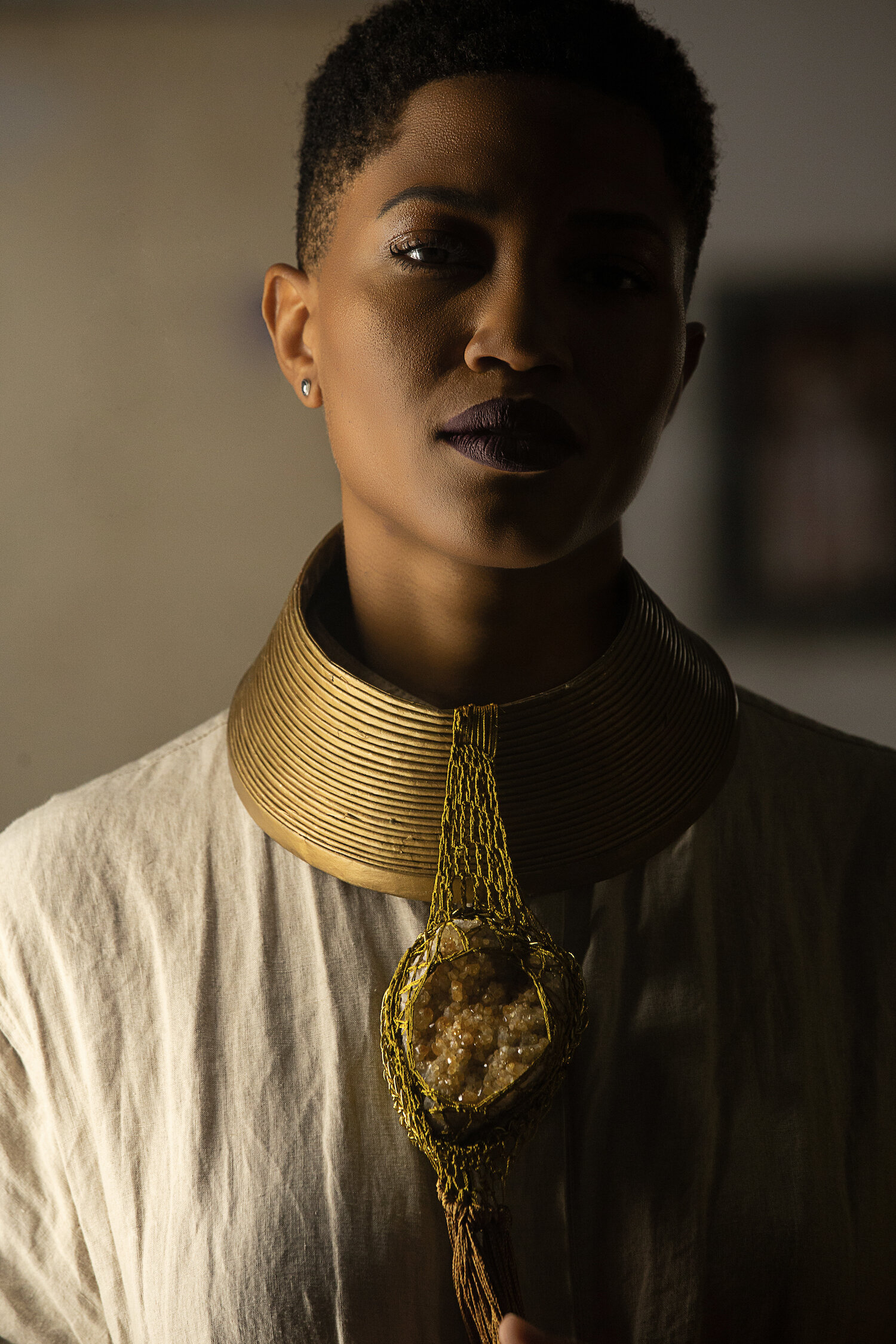Luedji Luna, connecting the dots
Luedji Luna, connecting the dots
Using writing as a starting point, Luedji Luna manufactures a music brimming with symbols of an African heritage and steeped in a society composed of Africans brought by force to Brazil during three centuries of the transatlantic slave trade. The daughter of professors and supporters of racial equality, the 30-year-old composer grew up in the middle class neighborhood of Salvador, Bahia. She was one of very few blacks in her neighborhood and school. This lonely setting served as a starting point for her work as a composer – which helped her to heal and set herself free.
“I grew up in a hostile environment. I studied in a private high school where I was one of the few black girls, I didn’t have many friends, and I suffered from this violence. I didn’t have any means to express myself in this world, and that’s how I started to write about silence, I began to use writing to help me exist in this world! When I first started there was no set form, it was free writing, and later, at the age of 17, after having read and studied, these texts took form. When I started it was very much a cathartic exercise,” Luna explains.
Luedji Luna, whose name refers to a word from Angola (in Tchokwe language, luej means river), has a law degree, but chose music as her path and as a means of resistance. Despite it being 130 years after slavery was abolished in Brazil, black people still must fight to exist in a racist society, where opportunities are scarce for them and where violence affects young blacks disproportionally. According to the information provided by the Senate’s Parliamentary Commission of enquiry on youth assassinations in 2016, seven out of ten people murdered are black; every 23 minutes, a young black person is killed.
“Racial issues are part of my work because racism overpowers black bodies, it overpowers our subjectivity. I write about the experience of this body, of this black woman in the world. I write about what I feel, about this experience of a black body within society,” the singer explains.
In her artistic offerings, Luna refers to and honors her ancestry and spirituality; from the “sacred leaves” to her “guiding orixa” as a conscious advocate of the history that preceded her existence; a past where the knowledge and culture of her African ancestors were destroyed. On this path of resisting racism, she founded Palavra Preta, meaning black word, with a friend; a movement bringing together black female composers and poets from all over Brazil.
Lack of Representation of Black Women
“We live in a macho society where a woman’s voice can hardly be heard. When I took the decision to make music, I was confronted with a reference crisis because I couldn’t grasp how women where represented in our music, and especially black women. Seeing singer Ellen Oleria win an award gave me a great deal of motivation. It inspired me, and that’s why I need to seize this moment of attention to help other women emerge, be listened to and supported,” says Luna.
Luna reminds us that she can write for/with men as well as for/with women within the space she is currently building, but that she makes her choices consciously as a committed black woman, in this quest for representation. That is also the reason why she sings what she writes and also sings what other black women write.
“We live in an age where the discussion on feminism is gaining ground. New composers are coming into existence,” says Luna.
Obviously, this position was conquered a long time ago by Clementina de Jesus (who died in 1987) and Leci Brandão, for instance. But except in samba, Luna points out that this presence was always rare, emphasizing the importance of Virginia Rodrigues who brings together erudite music, samba, jazz and references to African religions.
Um Corpo no mundo
Luna, who embraced her identity as a singer at the age of 25, released a video clip in 2016 that marked a turning point. A body in the world (also the title of her album) originated from her reflections on where the black body fits into the world.=
“I was intensely shocked when I arrived in São Paulo at the age of 27. I was used to a different dynamic in Salvador, to seeing black people. São Paulo is a very white place…. But at the same time, an important flux of refugees and migrants from Haiti and from African countries washed over the city. I felt at home when I realized that. And I then started wondering which of this/these Africa(s) I belonged to. Not only has there been violence and imprisonment of African peoples, there has been a wiping out of archives, of this source of knowledge. Where did my grandfather come from? This is something that is lost forever,” says Luna who lives between São Paulo and Salvador.
For Luna there is a real material and symbolic disappearance where the representation of Afro descendants exists nowhere, whether in the political sphere or in any domains of society. She wonders, “Where does the black body fit in the diaspora?” The song came first and then the story, which reflects on this question, in her video which includes the line, “I crossed the sea, a South American sun guiding me, with luggage in my hand, rich with a prayer, a farewell.”
She adds, “Today I feel at home in São Paulo, but I felt out of place in this city when I first arrived. There was no objective and accurate exchange, but I just felt hopeful when I saw these black people who are not from Brazil…. I can’t help but think that the fact they come here to Africanize this city is a positive thing. They deserve to seize the opportunities this country can offer.”
Dialogues
Luna wrote her first melody at the age of 17 and is engaged in a dialogue with Portuguese-speaking Brazilian and African artists such as Mayra Andrade (Cape Verde) and Aline Frazão (Angola) with which she just finished recording music with. In the past, Luna used to compose music with her guitar, but nowadays the creative process starts with writing.
"After having externalized these feelings through writing, I share them with musical partners to advance in my construction process. I think a lot about sharing more with this generation of artists from there. It's a dream to visit Africa and promote this bridge, "says Luna who in 2017 won the a Caymmi Music Prize in the revelation category, which was accepted in the Afro Prize edition that same year.
Black Girl Power
The team surrounding the artist is made up of a majority of black women, as a way of rebelling against a social fabric that is still very machist and racist.
“Angela Davis used to say, ‘When a black woman moves, the whole world moves.’ Black women are a source of social transformation in Brazil. Nobody is more powerful within Brazilian society than a black woman. I really believe that she is the key to the world’s salvation,” says Luna.
Luna believes that black women suffer from various modes of oppression because they live in an unequal society where gender and skin tone determine the space you are allowed to occupy. The plus side of this is that there is mounting social pressure to fight back against the silencing of these voices, through the influence of social media.
“We tend to forget that we are in nature, and in nature nothing stands still for a very long time. The oppressed will not stay oppressed within the course of history, and I believe that we are experiencing a natural trend where usually silent voices are now being vocal.”

